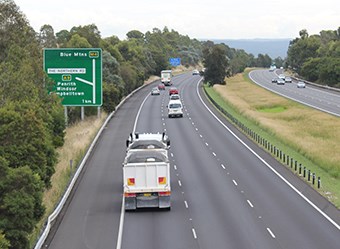NSW Transport Authority Calls for Review of National Chain of Responsibility Law

The fatal stretch of Sydney motorway where a cyclist was killed by a truck and dog. Image source: FullyLoaded.com.au
The transport authority in New South Wales wants national chain of responsibility law reviewed to address inconsistencies.
The authority highlighted a tragic case on a Sydney motorway which resulted in the death of a cyclist and a dog. The pair were killed by a truck driver who was fatigued and under the influence of cannabis. This case proves the need for national chain of responsibility laws to be changed, the NSW transport authority explained.
The authority is concerned that drivers who kill someone while fatigued can go to jail for up to a decade while the companies that push their employees into driving while the transport company is fined less than $90,000.
[Tweet “There is concern that drivers could be jailed for 10 yrs while the company is fined $90,000.”]
Something concerning authorities is that off-road parties in the chain of responsibility that break the law are likely to get off without any consequences.
As the country’s transport ministers are looking into changes to the chain of responsibility (COR), the NSW transport authority is urging them to address the inconsistencies which exist with regards to the treatment of drivers, operators and trucking customers. The ministers met on May 22 and one of the issues on their agenda was Chain of Responsibility laws.
According to an article on trucking industry site Fullyloaded.com.au one of the “hardest hitting” submissions to the National Transport Commission review of COR law for ministers came from the NSW Transport Authority. NSW heavy vehicle regulator, Roads and Maritime Services (RMS) also form part of Transport Authority NSW.
The Transport Authority’s submission includes a case study about an incident involving a Sydney company whose driver collided with 4 cyclists in the breakdown lane of the M4 motorway near Penrith in Sydney. One cyclist and a dog were killed.
The court found that the driver’s ability had been impaired by a combination of cannabis toxicity and fatigue and sentenced him to 10 years in prison with a non-parole period of 7 years.
The investigation revealed that the company’s directors and scheduler actively managed the work schedules and their scheduling had resulted in the driver being affected by fatigue yet the company received fines of less than $90,000.
The article on Fullyloaded.com.au revealed that,
“The investigation also found that the company was paying drivers for working in excess of the standard working hours and concealing this by paying them out of petty cash.
“The investigation by RMS found that the directors and the scheduler of the company would routinely contact the driver by phone to harangue him if the vehicle was stopped.
“The driver … had worked several consecutive 21 hour days in the two weeks leading up to the crash and had not had an adequate recovery break.”
Source: http://www.fullyloaded.com.au
The authority says shortcomings in the law significantly impact the ability to enforce the COR laws as demonstrated in this case.
Due to the complexity of the law at present, the court wasn’t able to charge the company with a single serious offence and was forced to issue a series of individual charges, the article goes on to explain:
“RMS was obliged to charge a series of individual offences in order to do adequately deal with the seriousness of the conduct” says the submission.
“Given the technical nature of the prescriptive requirements, and the requirement for the Courts to take an approach that resolves any doubt in favour of the accused, the 72 offences alleged against the company, scheduler and directors have been reduced by half.
“Even so the court did not view such a large number of charges favourably. The company, two directors and it scheduler were fined a total of $88,750.”
Source: http://www.fullyloaded.com.au
The Transport Authority for NSW is calling for the complete re-write of current COR law and says that the current approach significantly restricts the circumstances in which a party in the chain, other than a driver or an operator, can be prosecuted.
In its submission the authority also highlights that the potential cost impact of breaking the law is significantly lower than the risks associated with overlooking heavy vehicle national law obligations.
Another concern highlighted by the Transport Authority is distribution centres that favour paying local drivers hourly, while long-haul drivers are paid on kilometre rate.


